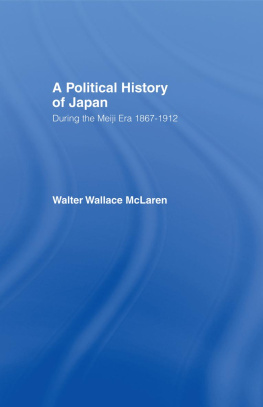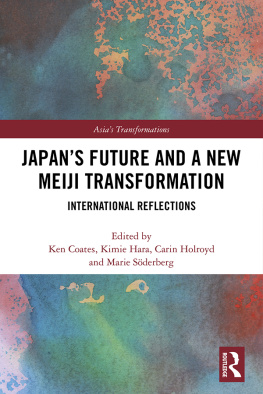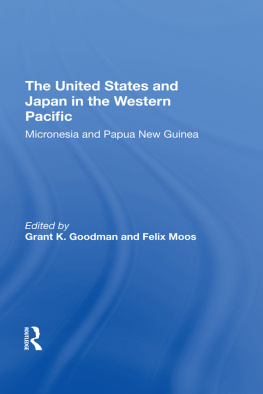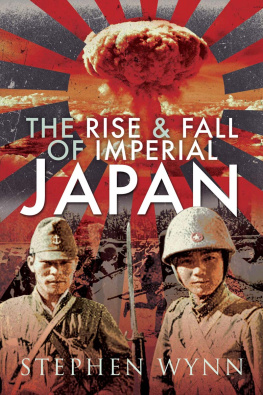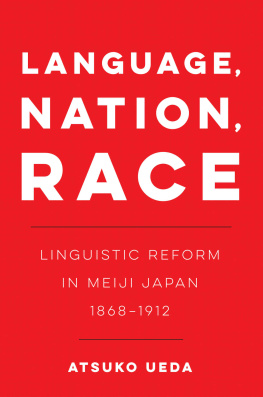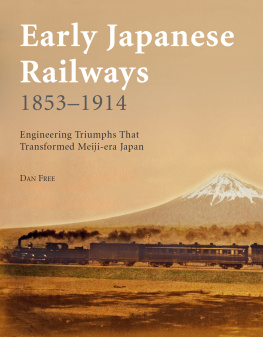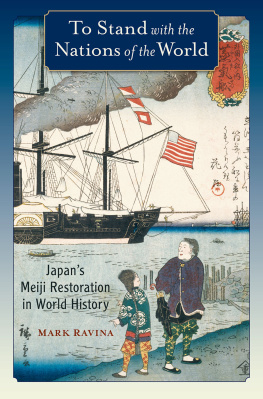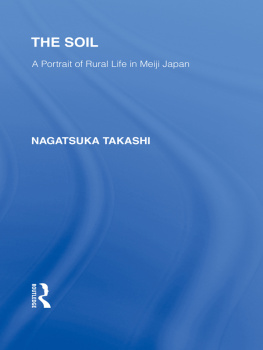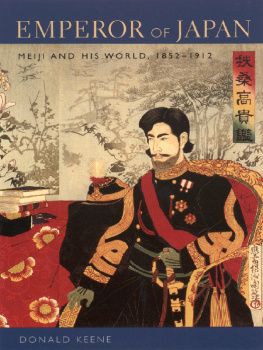
Ulysses S. Grant and Meiji Japan, 18691885
Ulysses S. Grant, besides being the General-in-Chief of the Union armies at the time of the Union victory in the American Civil War, was also President, 18691878, at a time when the United States was undergoing significant transformations, both economically and strategically, and growing in confidence as a world power. At the same time, Japan, following the Meiji Restoration of 1868, was seeking to join the ranks of the developed, read exclusively Western, states. This book explores the interaction of Grant with Meiji Japan, compares and contrasts developments in the two countries and assesses the impact each country had on the other. It discusses the travels of the Iwakura Mission in the United States, considers Grants 1879 visit to Japan and examines the personal relationship between Grant, the Meiji emperor and the other leaders of the Meiji government. The book argues that Grants thoughtful consideration of the key issues of the day, issues common to many countries at the time, and his suggested policy responses had a huge impact on Meiji Japan.
Ian Patrick Austin is a Senior Lecturer in International Business at Edith Cowan University, Western Australia.
Routledge Studies in the Modern History of Asia
Voices of the Korean Minority in Postwar Japan
Histories Against the Grain
Erik Ropers
Germanys Colony in China
Colonialism, Protection and Economic Development in Qingdao and Shandong, 18981914
Fion Wai Ling So
Conflict, Community, and the State in Late Imperial Sichuan
Making Local Justice
Quinn Javers
China in Australasia
Cultural Diplomacy and Chinese Arts since the Cold War
Edited by James Beattie, Richard Bullen and Maria Galikowski
Hagi A Feudal Capital in Tokugawa Japan
Peter Armstrong
Lord Salisbury and Nationality in the East
Viewing Imperialism in its Proper Perspective
Shih-tsung Wang
Ulysses S. Grant and Meiji Japan, 18691885
Diplomacy, Strategic Thought and the Economic Context of USJapan Relations
Ian Patrick Austin
For a full list of available titles please visit: www.routledge.com/Routledge-Studies-in-the-Modern-History-of-Asia/book-series/MODHISTASIA
Ulysses S. Grant and Meiji Japan, 18691885
Diplomacy, Strategic Thought and the Economic Context of USJapan Relations
Ian Patrick Austin
First published 2019
by Routledge
2 Park Square, Milton Park, Abingdon, Oxon OX14 4RN
and by Routledge
52 Vanderbilt Avenue, New York, NY 10017
Routledge is an imprint of the Taylor & Francis Group, an informa business
2019 Ian Patrick Austin
The right of Ian Patrick Austin to be identified as author of this work has been asserted by him in accordance with sections 77 and 78 of the Copyright, Designs and Patents Act 1988.
All rights reserved. No part of this book may be reprinted or reproduced or utilized in any form or by any electronic, mechanical, or other means, now known or hereafter invented, including photocopying and recording, or in any information storage or retrieval system, without permission in writing from the publishers.
Trademark notice: Product or corporate names may be trademarks or registered trademarks, and are used only for identification and explanation without intent to infringe.
British Library Cataloguing-in-Publication Data
A catalogue record for this book is available from the British Library
Library of Congress Cataloging-in-Publication Data
Names: Austin, Ian Patrick, author.
Title: Ulysses S. Grant and Meiji Japan, 186985 : diplomacy, strategic thought and the economic context of USJapan relations / Ian Patrick Austin.
Description: London ; New York : Routledge, 2019. | Series: Routledge studies in the modern history of Asia | Includes bibliographical references and index. | Identifiers: LCCN 2019016098 (print) | LCCN 2019017324 (ebook) | ISBN 9780429275104 (Ebook) | ISBN 9781000021929 (Adobe Reader) | ISBN 9781000022155 ( Mobipocket) | ISBN 9781000022384 (ePub3) | ISBN 9780367224813 (hardback)
Subjects: LCSH: Grant, Ulysses S. (Ulysses Simpson), 18221885TravelJapan. | Iwakura Shisetsudan (Japan) | United States Foreign relationsJapan. | JapanForeign relationsUnited States. | United StatesForeign relations19th century. | JapanForeign relations19th century.
Classification: LCC E183.8.J3 (ebook) | LCC E183.8.J3 A928 2019 (print) | DDC 327.7305209/04dc23
LC record available at https://lccn.loc.gov/2019016098
ISBN: 978-0-367-22481-3 (hbk)
ISBN: 978-0-429-27510-4 (ebk)
Typeset in Times New Roman
by Wearset Ltd, Boldon, Tyne and Wear
Dedications
This book is dedicated to two of the finest economic historian scholars it has been my privilege to know and share thoughts with over the last decade or more.
Richard E. Sylla
Professor Emeritus of Economics and the former Henry Kaufman Professor of the History of Financial Institutions and Markets at New York University Stern School of Business.
and
Kenichi Tomobe
Professor, Graduate School of Economics, Hitotsubashi University, Tokyo.
Spelling:
Within this work, the United States spelling has been utilized except in the case of quotations and original author use.
Contents
Ian Patrick Austin is an Australian-American researcher on American and East Asian political economy and currently works for Edith Cowan University, Perth, Australia as a scholar in the field of international business. He is the author, co-author and editor of several works on American, Australian and Asian affairs; and this study is directly related to two previous endeavors: Pragmatism and Public Policy in East Asia: Origins, Adaptations and Developments (2001) and Common Foundation of American and East Asian Modernisation: from Alexander Hamilton to Junichiro Koizumi (2009). Ian has worked for Australian and Singaporean governments and tertiary institutions researching and lecturing in areas international political economy, international business and comparative management. He has also worked in international business focusing on consultancy and events management, marketing and logistics. Finally, Ian continues to work actively in Australian politics and public policy, with a focus on Australias relations with Asia.
This work examines the personal relations and international contexts of the relationship between Ulysses S. Grant (18221885) and the Meiji governing elite (18681912) of Japan, not the least the young Emperor Mutsuhito (18521912). As the opening quotation of this work by Keene (2002) makes clear, Grant would leave a most significant personal and policy impression upon the Meiji Emperor of Japan, and this applied equally of his inner governing circle (including the seminal Meiji figure Ito Hirobumi [18411909], whose constitutional work has been examined within the Routledge Modern Asian History of Asia Series). The study examines the dynamics of the GrantMeiji relationship through: the series of interactions in Washington D.C. between President Grant and the men of the Iwakura Embassy in 1872, and between Grant and the core leadership of Meiji regime in TokyoYokohama in 1879 (with Iwakura Tomomi [18251883] and Ito Hirobumi being the most prominent Meiji figures across both exchanges). It then examines Grants visit to Japan in that year (1879) in what would be not only the last, but the longest time-in-country visit (June 21September 3, 1879, 74 days), of his and his wife Julias two-plus-year journey around the world. In 1879, Grant engaged with the Meiji regime in a series of groundbreaking dialogues with the Emperor himself, the complete upper echelons of the governing and military elite of the regime, and in equally groundbreaking international diplomacy as a neutral arbiter of a regional territorial dispute between Japan and China. Finally, the study concludes by examining the post-tour years of his life (18791885), when Grant showed a deep and continuing interest in working toward developing Americas diplomatic and trading engagement with not only Japan, but also with China and greater Asia, and these overtures were reciprocated in the soft-diplomacy actions of the Meiji regime as Grant fought his ultimate final battle.


